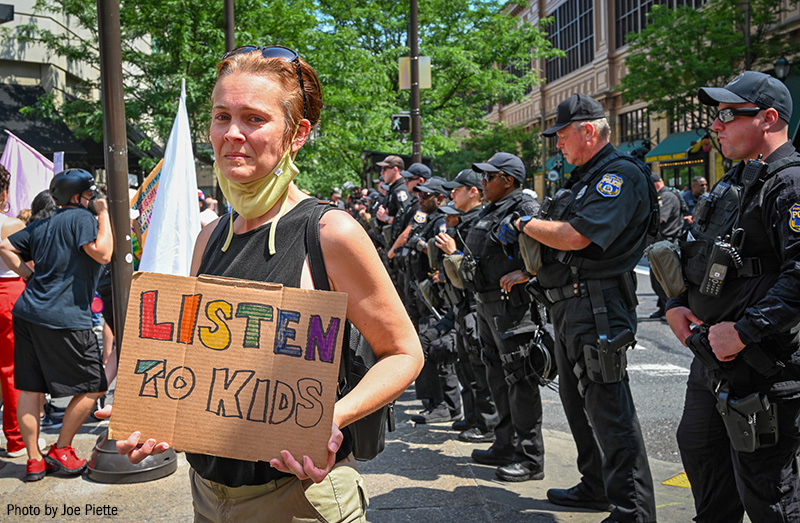On ‘Klanned Karenhood’: The outrage of Moms for Liberty cannot be the narrative
Moms for Liberty has waged war on public education and democratic values, leveraging fear and disinformation. There are steps to take, including exercising your own First Amendment rights to uphold a just and equitable society.
 |
Protesters took to the streets July 2, demonstrating against Moms for Liberty, which held its Joyful Warrior Summit in Philadelphia. |
Why don’t you reach out to them? an associate queried me on social media. Moms for Liberty? I tried to make sense of the suggestion.
Did they think we were going to just talk it out? They’re moms, I’m a mom, surely we could reach some conciliatory common ground. Alas, I demurred and, with the hope that it would register, offered: Moms for Liberty is a hate group.
The record of the organization speaks for itself. In the name of advancing parental rights, Moms for Liberty has waged war on public education, promoting book banning in school libraries and rejecting race-related curriculum and the factual teaching of history. Claiming a membership of 100,000+ in 250 chapters, Moms for Liberty has leveraged fear and misinformation to draw followers, aligning with the hard-right and gaining favor among the GOP. Donald Trump and Ron DeSantis, among other presidential candidates, flocked to the group’s Joyful Warrior summit in Philadelphia last month.
Opening the event, the Florida governor denounced SEL (social emotional learning) and the Common Core State Standards as exemplars of “woke ideology,” reported Education Week. For his part, Trump promised “a new executive order to cut federal funding for any school pushing critical race theory, transgender insanity, and other inappropriate racial, sexual, or political content on our children.” Also on the Joyful dais: KrisAnne Hall, an anti-government attorney with ties to the Oath Keepers, the militia group that helped organize the Jan. 6 attack on the U.S. Capitol.
A fundamental misalignment
“Schools are a primary target for locally driven extremist mobilization,” according to the Southern Poverty Law Center (SPLC). At the forefront is Moms for Liberty, which SPLC cited in its latest Year of Hate & Extremism report as among 12 anti-student inclusion groups “leading a movement to gain power through school boards to attack public education, ban books, and remove any curriculum that contains discussions of race, discrimination, and LGBTQ+ identities.”
Maya Henson Carey, SPLC research analyst, reminds me that Moms for Liberty was designated as an anti-government organization (which encompasses anti-student inclusion) and not a hate group, but only after “much, much debate,” she says. SPLC recommends as a response holding these groups accountable. “Hopefully with the SPLC label we’ll see more of that,” says Henson Carey.
One practical resource is “Confronting White Nationalism in Libraries: A Toolkit.” Created by the Western States Center in partnership with a group of concerned librarians spanning K–12, public, and academic institutions, the guide cites steps libraries can take, from signage and collection displays that embrace difference and building political support to educating the community about the threat of white nationalism. “Take steps to be prepared,” says Lindsay Schubiner, Western States’s director of programs. Install policies that align with the library mission and prioritize staff safety. Planned protests give libraries advance notice, but this won’t always be the case.
“Libraries and other public institutions need to be aware of free speech requirements,” she adds, “but what we really encourage is for institutions to exercise their own free speech.” It can be powerful when library leaders speak out against bigotry, a core tool anti-democracy groups wield to build power using harassment and intimidation. The end goal is pushing democratic institutions out of public life, says Schubiner.
When it comes to dialogue, she wouldn’t debate whether LGBTQIA+ people have a right to exist in this country. “It’s important to be clear-eyed about the fundamental misalignment with democratic values,” she says.

RELATED
The job outlook in 2030: Librarians will be in demand
The job outlook in 2030: Librarians will be in demand
ALREADY A SUBSCRIBER? LOG IN
We are currently offering this content for free. Sign up now to activate your personal profile, where you can save articles for future viewing







Add Comment :-
Be the first reader to comment.
Comment Policy:
Comment should not be empty !!!